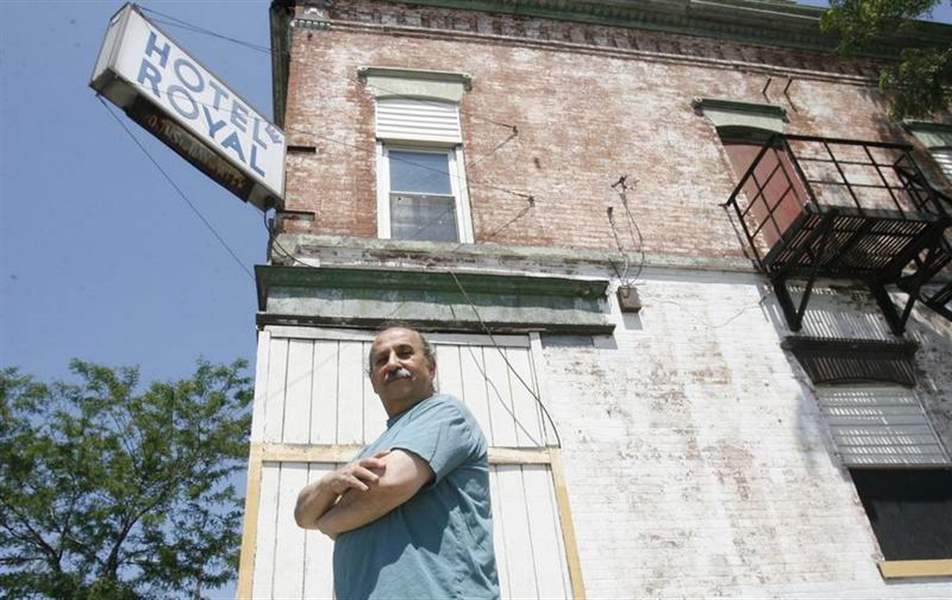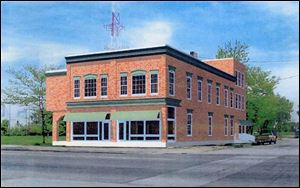
Toledo hostel slowed, not stopped by lack of funding
6/14/2007
Sarkis David, who owns a sub shop and deli across the street from the Hotel Royal, is a supporter of the hostel project.

Sarkis David, who owns a sub shop and deli across the street from the Hotel Royal, is a supporter of the hostel project.
Bolted to the long vacant Hotel Royal near downtown Toledo, a weathered pair of signs with faded red lettering announce the future site of a travelers' hostel.
The signs are now seven years old, and the grimy brick building with boarded-up windows at 337 Broadway still looks more like a rundown flophouse than a bright and cheery welcome lodge.
After a much publicized beginning in the late 1990s, the project to transform the old hotel into the Toledo International Hostel/Guesthouse has been experiencing a slowdown.
The hostel had missed anticipated opening dates since its 2000 ribbon-cutting because much of the money its supporters were anticipating never materialized, said Jerry Gill, president of the Toledo International Hostel/Guesthouse Corp., a nonprofit group that has been coordinating the project and raising funds.
Yet the project has not been at a complete standstill, and proponents say it continues to inch forward. The all-ages hostel is to have 40 beds at rates starting around $20, and also would offer a four-bedroom guesthouse.

An artist's conception of what the hostel would look like.
"It's one piece at a time," Mr. Gill said. "We've been working at it about 10 years, and we're not giving up."
Mr. Gill said his group has continued to hold fund-raisers and solicit businesses and organizations for donations and building materials.
Members have been making interior repairs, and have hired specialists to investigate the building's structural integrity.
The group now holds its monthly meetings in a renovated room at the rear of the building.
Today, the Toledo Plan Commission is scheduled to consider a proposal to vacate a portion of an alley to make way for the hostel's parking lot.
According to Mr. Gill's estimates, nearly $300,000 has been invested in the hostel project, but $350,000 to $500,000 more is needed to finish the work.
Mr. Gill said though the project has been held back by a lack of donations, its greatest blow occurred when the city, in an effort to balance the budget in late 2004, cut $107,000 of capital improvement funds that had been slated for the hostel.
The hostel also had been banking on capital improvement funds from the city that never came through. "If we had our money back, we probably could have it half done by spring [2008]," Mr. Gill said.
Among the project's other champions is Sarkis David, who owns the Original Sub Shop & Deli which is cater-corner on Broadway from the hostel building.
Mr. Davis said the hostel would be in a prime location: near the Amtrak station and close to downtown.
It also would be an ideal place to house visitors from Toledo's sister city in Spain, he added.
"Most of the good-sized cities have something like this," Mr. David said. "It's a good draw for international travelers, but it's not specifically for international travelers. It could be students from different states, and people who visit cities and deliberately seek hostels to stay in."
The Toledo area has been without a hostel for more than a decade. The city's last hostel operated out of the home of an elderly West Toledo couple and closed in 1993.
Soon after, another hostel in Bowling Green shut its doors.
Jim Williams, editor of The Hostel Handbook, said he has counted 305 hostels in the United States, but the majority are on the East and West coasts.
"There is such a shortage in the Midwest in general," he said.
Businessman Yehia "John" Shousher bought the Hotel Royal for $30,000 in 1999 and donated it to the city to be developed into the hostel that Mr. Gill's group envisions. The group now leases the building from the city for $1 a year.
Since it acquired the building, the city reports having spent more than $40,000 on improvements.
Mr. Gill said there is about $5,000 set aside for sprucing up an adjacent parcel named Anastasia Park in honor of the late Anastasia Kaptur, the mother of U.S. Rep. Marcy Kaptur (D., Toledo).
Miss Kaptur was among a group of officials and dignitaries at the hostel's ribbon-cutting in July, 2000, along with Jamie Farr and Mayor Carty Finkbeiner.
A Kaptur spokesman, Steve Fought, said yesterday that the congressman still supports the hostel.
"The park itself still has a way to go," he said, "But she appreciates the gesture and wishes them well."
Contact JC Reindl at:
jreindl@theblade.com
or 419-724-6050.